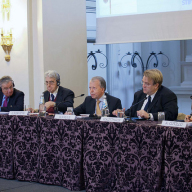First German-Italian Dialogue on the Future of Europe: “Germany and Italy — Partners in Constructing Europe”

On 22 and 23 January, 2015, the Institut für Europäische Politik (IEP) and the Istituto Affari Internazionali (IAI) organised the first German-Italian Dialogue on the Future of Europe at the Residenza di Ripetta in Rome. Under the title “Germany and Italy – Partners in Constructing Europe” some 200 participants from Italy and Germany discussed the current challenges within the European Union (EU) in the areas of economic policy, energy policy and foreign policy as well as Germany’s and Italy’s role and contribution to the construction of Europe’s future.
This first German-Italian Dialogue was attended by top-ranking representatives from politics, business and academia, along with young researchers and professionals, to discuss possible solutions to the current European challenges from German and Italian perspectives. As core members of the EU, both countries share a particular responsibility for solidarity in times of crisis, which has been manifested both in terms of content and values as well as in the long-standing collaboration between the two states.
By tackling the questions of a common European strategy to strengthen competitiveness, growth and employment in Europe, of the challenges in Eastern Europe and of the development of further integration measures, e.g., in the form of an energy union, the forum was devoted to a wide range of themes over these two days.
Michele Valensise (Secretary General, Italian Ministry of Foreign Affairs and International Cooperation, Rome), Martina Nibbeling-Wrießnig (Minister Plenipotentiary and Director, Department for Economy, Finance and Social Affairs; Deputy Director of the German Embassy in Rome) and Claudia Dörr-Voß (Director General for European Policy, Federal Ministry for Economic Affairs and Energy, Berlin) opened the conference by emphasizing the significance of analyzing these problems against the background of events concurrent to the conference, such as the European Central Bank’s (ECB) announcement on the quantitative easing programme, the ongoing unrest in Ukraine, the pending election in Greece, and the accompanying uncertainty about the future development of the Eurozone and of the EU as a whole.
By Josefa Glass and Anthony Baumann













